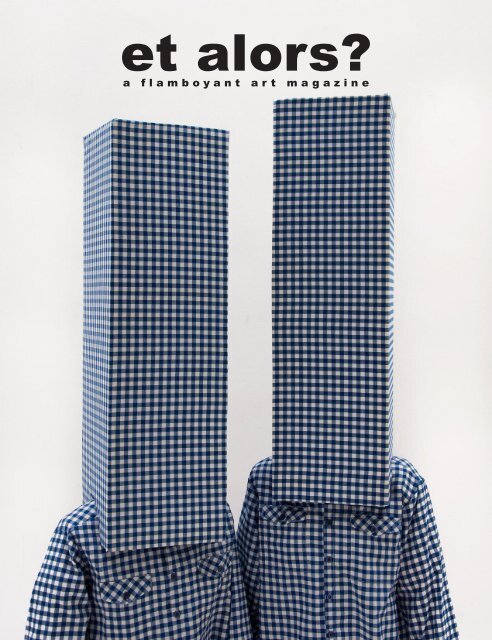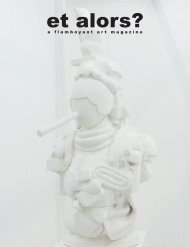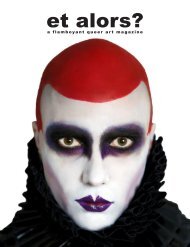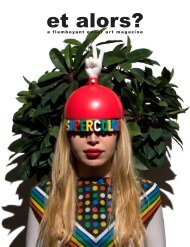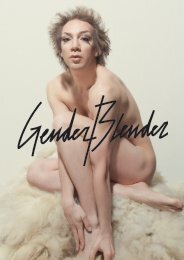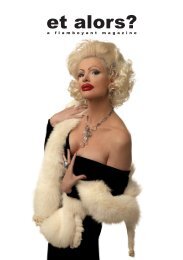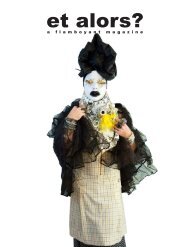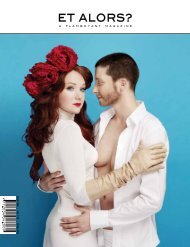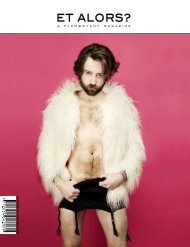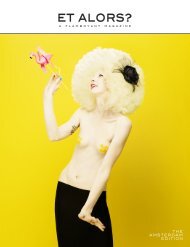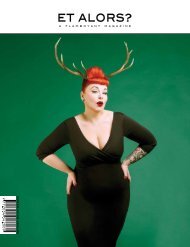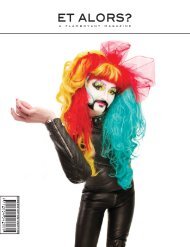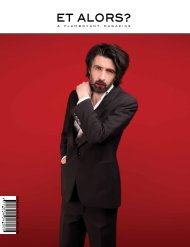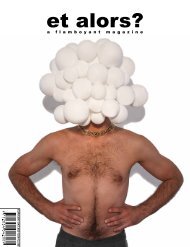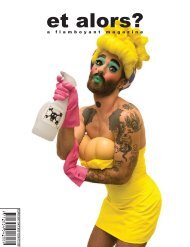Et Alors? Magazine 19
Et Alors? Magazine is an online project in motion, co-created by female artist duo and lovers Fleur Pierets and Julian P. Boom, who’s work questions the mainstream understandings and the construction of the (gay) identity. Their conceptual self-portraits and staged scenes challenge the boundaries of gender and contemporary femininity through visual knowledge. In Et Alors? Magazine, Fleur & Julian publish their conversations with musicians, visual artists, writers and performers by whom they are inspired, and share artwork and locations that caught their eye.
Et Alors? Magazine is an online project in motion, co-created by female artist duo and lovers Fleur Pierets and Julian P. Boom, who’s work questions the mainstream understandings and the construction of the (gay) identity.
Their conceptual self-portraits and staged scenes challenge the boundaries of gender and contemporary femininity through visual knowledge.
In Et Alors? Magazine, Fleur & Julian publish their conversations with musicians, visual artists, writers and performers by whom they are inspired, and share artwork and locations that caught their eye.
You also want an ePaper? Increase the reach of your titles
YUMPU automatically turns print PDFs into web optimized ePapers that Google loves.
et alors?<br />
a flamboyant art magazine
© Fleur Pierets
editorial<br />
Darlings,<br />
‘The one thing<br />
they all have<br />
in common is<br />
the ability to<br />
make our hearts<br />
beat a little<br />
faster with the<br />
promise of great<br />
possibilities.’<br />
The thing we like most about making and writing <strong>Et</strong> <strong>Alors</strong>?<br />
<strong>Magazine</strong> is that it’s a project in motion. A venture that keeps<br />
transforming and evolving in the same way that we do.<br />
In our first issue we started off with tons of photoshoots,<br />
interviews with close artist-friends and an eagerness to<br />
discover all the drag queens in this world. Along the process<br />
of writing and talking to people, however, we discovered that<br />
our heart lies with telling stories. Inspiring readers by telling<br />
the stories of inspirational people. Spreading the message<br />
that it’s okay to be or feel different, that a lot of people have<br />
been there and showing what good came out of that!<br />
Meanwhile, we too kept evolving - don’t worry, we still have a<br />
soft spot for drag queens - but with issue <strong>19</strong> in the making we<br />
took yet another slightly different approach to what we want<br />
to express by putting our thoughts online and bundling them<br />
into a magazine. Not only do we want to share the artist talks<br />
we had in the past few months, we also want to show you<br />
some amazing places we came across along the way. Places<br />
where artists went awol while creating their own unique<br />
world they call paradise.<br />
We kick off with Le Jardin d’Hélys, an experimental art place,<br />
created ages ago by an artist duo now in their seventies. We<br />
unexpectedly ran across the house and garden while passing<br />
through the smallest of places in France. Alain and Monique<br />
invited us in and gave us a grand tour of the house -one of<br />
the highlights being an installation covered in dust, cobwebs<br />
and it’s inhabitants. Monique passionately called it her ode to<br />
Louise Bourgeois.<br />
Furthermore we’ll show you which other artists we came<br />
across and inspired us. Sometimes just one picture,<br />
sometimes an entire series. Point is that we felt enthusiastic<br />
to share it with you.<br />
Alike the artist talks we had this summer. We spoke to Sarah<br />
Bettens, charismatic front woman of the international rock<br />
band K’s Choice, South-African artist Lebogang Mokgoko<br />
and writer Annelies Verbeke. The one thing they all have in<br />
common is the ability to make our hearts beat a little faster<br />
with the promise of great possibilities.<br />
Enjoy reading our <strong>19</strong>th issue of <strong>Et</strong> <strong>Alors</strong>? <strong>Magazine</strong> as much<br />
as we enjoyed assembling it. It comes from a good place.<br />
Keep safe, stay gorgeous,<br />
Fleur & Julian<br />
003
et alors? magazine<br />
september 2016<br />
issue <strong>19</strong><br />
Text & research<br />
Fleur Pierets<br />
Artwork & layout<br />
Julian P. Boom<br />
Contributors<br />
Damien Frost<br />
Frank Clauwers<br />
Guda Koster<br />
Keletso Nkabiti<br />
Lee Sol<br />
Lunga Ntila<br />
table of contents<br />
Editorial<br />
Table of contents<br />
Night Flowers<br />
Lee Sol<br />
Sarah Bettens<br />
Guda Koster<br />
The Tourists<br />
Annelies Verbeke<br />
Le Jardin d’Hélys<br />
Lebogang Mokgoko<br />
002<br />
004<br />
006<br />
016<br />
024<br />
034<br />
042<br />
046<br />
054<br />
070<br />
<strong>Et</strong> <strong>Alors</strong>? <strong>Magazine</strong> © 2016<br />
www.etalorsmagazine.com<br />
004
<strong>Et</strong> <strong>Alors</strong>? <strong>Magazine</strong> is an online<br />
project in motion, co-created by<br />
female artist duo and lovers Fleur<br />
Pierets and Julian P. Boom, who’s<br />
work questions the mainstream<br />
understandings and the<br />
construction of the (gay) identity.<br />
Their conceptual self-portraits<br />
and staged scenes challenge<br />
the boundaries of gender and<br />
contemporary femininity through<br />
visual knowledge.<br />
In <strong>Et</strong> <strong>Alors</strong>? <strong>Magazine</strong>, Fleur &<br />
Julian publish their conversations<br />
with musicians, visual artists,<br />
writers and performers by whom<br />
they are inspired, and share<br />
artwork and locations that caught<br />
their eye.<br />
Subscribe to our quarterly<br />
newsletter, submit your work or<br />
just say hello at<br />
info@etalorsmagazine.com<br />
fleur & julian say thanks to<br />
Tracy Atkins<br />
Renate Breuer<br />
Ingrid Van Den Bossche<br />
cover<br />
Photo Guda Koster<br />
Location The Netherlands<br />
Talents Conceptual artist<br />
Website www.gudakoster.nl<br />
© All material in this magazine is copyrighted as indicated.<br />
005
night<br />
flowers<br />
interview fleur pierets<br />
photos damien frost
As most of central London closes down late at night and<br />
the crowds head home, there are a select few who only<br />
come out after midnight. These ‘Night Flowers’, as they<br />
refer to themselves, encompass a loose-knit community<br />
of drag kings and queens, club kids, Goths, alternative<br />
queer and transgender people, fetishists, and cabaret<br />
and burlesque performers – all of whom bloom late<br />
at night and burn brightly under the city’s neon lights.<br />
Damien Frost’s arresting photographic portraits capture<br />
those who dwell on the fringes of nightlife in modern<br />
London, dressing in all manner of guises. The resulting<br />
book is an extraordinary and powerful document of the<br />
ultimate alternative street style.<br />
How did you come across the Night Flowers?<br />
It wasn’t intentional at all – I started a portraita-day<br />
project where I set out to take a photo of<br />
a stranger every day for a year. I wanted to take<br />
photos of the more “interesting” characters I would<br />
see out on the streets of London. In an attempt to<br />
document what I like about this town – the large<br />
cross-section of people in the city, but also the idea<br />
that, to a certain extent, you can be who you choose<br />
to be in a town like this. As the project progressed I<br />
started to stay out later and later in search of ever more<br />
interesting characters to photograph and this is how I<br />
began photographing the Night Flowers.<br />
Tell me about the zeitgeist. Is it a relatively new scene<br />
of performers?<br />
I’d say that at the moment it’s a fairly exciting time in<br />
London – there are a number of very established people<br />
performers, drag artists and club kids and still there<br />
are always new people popping up and visiting from<br />
abroad. There are a number of clubs, pubs and parties<br />
that really foster and encourage this sort of creative<br />
expression. It can be quite a diverse scene and also<br />
a strong community. The people in my photographs<br />
are a mix of established, new artists and performers,<br />
but there’s definitely a focus on the younger end of<br />
the spectrum. Mostly because I live in East London<br />
and the scene here tends to be a bit younger and a bit<br />
grittier (and trashier to some extent). For some of them<br />
I might be capturing their first night out in drag and it<br />
can be interesting mapping their journey from slightly<br />
clunky and rough make up to incredibly refined and<br />
extraordinary looks. There are others who have been on<br />
the scene for years and are seasoned performers. But<br />
I enjoy shooting both just as equally. My photographs<br />
are very much a product of chance and who I happen to<br />
see on that night. I do however gravitate towards taking<br />
photos of the more extreme or avant-garde looks<br />
(regardless of who they are) rather than taking photos<br />
of personalities.<br />
How’s London these days when it comes to Night<br />
Flowers’?<br />
It’s interesting using the term Night Flowers to describe<br />
a community because as much as it’s defined by the<br />
drag and club kid scene it’s also encompassed by the<br />
Goth and burlesque, cabaret and fetish scenes, as well<br />
as owing a debt to the dandies of years past. London<br />
has a long lineage of this sort of creative expression.<br />
Ever since the explosion of the club kid scene in the 80’s<br />
it’s been a part of the tapestry of London’s nightlife to<br />
one degree or another. Yet it could be argued that in<br />
the last few years it’s undergone a bit of a renaissance,<br />
perhaps buoyed by the popularity of television shows<br />
like Drag Race or simply through social media channels<br />
which have maybe encouraged people to push the<br />
limits a bit further and play with more avant-garde<br />
looks and fashions. More importantly the social media<br />
channels have helped foster a community and make it<br />
more visible and subsequently offer a support network<br />
for people wishing to explore this side of themselves.<br />
But like anything else it ebbs and flows and changes<br />
location and feeling, as venues or club nights close and<br />
new ones open and attract slightly different audiences.<br />
Is the series a document of time?<br />
I do see the series very much as a document of a time<br />
and place. One thing that people often don’t realize<br />
with the images is that they’re not set up- the photos<br />
are taken on the streets and in clubs where the people<br />
are already dressed like this. There’s no styling involved<br />
and aside from standing them in front of a particular<br />
background and getting them to stand a certain way<br />
there’s no styling or pre-planning involved. I’d like to<br />
think that in 20 years time you’ll be able to look back at<br />
these images and get a feel for what was happening in<br />
this particular form of creative expression in London at<br />
this time.<br />
What’s your personal fascination with them?<br />
In a general sense it’s the creative expression. I like<br />
the ephemeral nature of it - the fact that certain looks<br />
may never be repeated or that people might only be<br />
experimenting with this type of expression and might<br />
only be doing it for a short period. And also the sense<br />
of community. I’m attracted to the anti-establishment<br />
008
‘The popularity of<br />
television shows like<br />
Drag Race and social<br />
media channels,<br />
encourage people to<br />
push the limits a bit<br />
further and play with<br />
more avant-garde<br />
looks and fashions.’
ethos that’s inherent in the scene. When I was younger<br />
I used to hang out with a lot of Goths and punks and<br />
I see a parallel between the scenes - a rejection of<br />
societal norms and a general feeling that you can be<br />
who you want to be. Or in the case of many people<br />
in the photographs; undergo a process of constant<br />
reinvention.<br />
What inspired you to turn it into a series?<br />
This came about quite naturally. During the process<br />
of taking a portrait a day I started to realize that I was<br />
documenting a loose-knit community. I’ve always been<br />
interested in aspects of community and to a certain<br />
extent the process of ethnography. I see this project<br />
as an extension of this. I also felt slightly guilty for<br />
demanding so much time from people, taking them<br />
out onto the cold streets to take photos and I felt that<br />
by turning it into a book it would also somehow justify<br />
all the time and effort everyone was giving me. Also as<br />
I started to pose most of the subjects of the portraits in<br />
front of dark backgrounds (which are usually dark walls<br />
on the street or sometimes a portable backdrop I’d take<br />
to parties with me) the photos naturally started to feel<br />
like they were part of a series.<br />
You have a background in opera and theatre. Is this a<br />
continuation of your work?<br />
There are definite parallels between my day job and<br />
my photographs but one of the main differences is<br />
that in my day job - where I work as a graphic designer<br />
and sometimes photographer / art director for theatre,<br />
opera and ballet - the people I’m working with are<br />
playing a character. With my photographs, sometimes<br />
the people I photograph see themselves as playing a<br />
character when they are out of make-up. When they’re<br />
in their make-up and costume in the dark of the night,<br />
that’s when they truly become themselves. It can be a<br />
difficult thing to do sometimes. But for the most part<br />
I try to avoid taking photos of people who are playing<br />
“fancy dress”. Instead I’m looking for people who are<br />
expressing some part of who they really are.<br />
What’s next?<br />
I’d really like to continue this series of photos in other<br />
cities and in other countries and I’ve also started a<br />
project portraying strangers and how I’m fascinated by<br />
the inside of their homes.<br />
www.soulstatic.net<br />
www.merrellpublishers.com<br />
015
lee sol
To be honest, the colour pink never fails to excite<br />
me, yet it seems always a bit uncomfortable to<br />
incorporate in art. Its use in Barbies clothes and<br />
girl’s toys associates the color with femaleness<br />
and intimacy and makes it one of the less neutral<br />
colours, often - both in an uplifting and derogatory<br />
way - discussed in gender issues. In Bad Feminist,<br />
her collection of essays, American feminist writer<br />
Roxane Gay even states that: “I used to say my<br />
favourite colour was black to be cool, but it is<br />
pink – all shades of pink. If I have an accessory it<br />
is probably pink.” Which, according to her own<br />
judgement, makes her a bad feminist. However,<br />
things seem to change. Newspaper The Guardian<br />
recently published an article taking on a new<br />
approach on pink and and wrote that “In recent<br />
years pink has become a dirty word associated<br />
with gendered toys and stereotypical ‘girliness’.<br />
But now writers and artists are fighting to redefine<br />
the colour as subversive and grown up”. British<br />
artists Liv Thurley and Aryana Hessami even curated<br />
PINKD, a limited-edition art book that featured 30<br />
artists exploring Pink art in today’s society. One of<br />
the artists not afraid of using the color is Korean<br />
graphic artist Lee Sol. Via his Instagram account<br />
@venusmansion he brings a 3-d surreal mixture of<br />
classical sculptures like Michelangelo’s David and<br />
Venus de Milo into a candy coloured dream world.<br />
The iconic statues stand in line for what can either<br />
be an unemployment office or they are sidelined,<br />
waiting for the garbage truck because they are too<br />
many, and their duplications got out of hand. An all<br />
pink display - consisting of vases, shoes, candles, a<br />
Hermés handbag and Starck’s Juicy Salif - is waiting<br />
for customers, or for someone to lick it and check if<br />
it tastes just like it looks. Or maybe it’s just there for<br />
no reason at all. When asked about the narrative, Sol<br />
explained that he “prefers his audiences to have an<br />
open interpretation and enjoy the works more freely<br />
rather than to give away the purpose of meaning<br />
behind the works of Venus Mansion.” His work is a<br />
means to express himself and comes from emotions<br />
that arise from seeing a certain object. The graphic<br />
artist recently commissioned for Vogue Korea and<br />
turned 6 brightly coloured berets into a work of art.<br />
www.instagram.com/venusmansion<br />
021
“When we<br />
talk about the<br />
culture we<br />
consume it is<br />
often a dance<br />
around how<br />
we wish to be<br />
seen; what<br />
we enjoy<br />
reflects on<br />
who we are.”
grayson perry
sarah<br />
bettens<br />
interview fleur pierets<br />
photos frank clauwers
I’ve always been very much intrigued by Sarah<br />
Bettens. When I saw K’s Choice perform in <strong>19</strong>94<br />
they had not yet recorded their monster hit “Not<br />
an Addict”, which opened doors not only in Europe<br />
but also lead to touring across the US with, amongst<br />
others, Alanis Morissette and the Indigo Girls. Yet in<br />
<strong>19</strong>94 I saw a girl run to her microphone, hold onto<br />
it for the entire song and who looked at her feet for<br />
the duration of the applause. A lot has changed since<br />
then and that girl cannot be compared to the über-fit<br />
and charismatic front woman she is today. We catch<br />
up in the backstage area of a Dutch music festival to<br />
talk about change, identity and challenges.<br />
You once said you were lucky K’s Choice became<br />
popular. What’s luck got to do with it?<br />
I think there was a lot of coincidence involved. My<br />
brother and I have been making music for as long as<br />
I can remember but we never thought about it as a<br />
future job. The idea itself was even too unrealistic to<br />
dream about, so let’s just say we never considered it<br />
a possibility.<br />
Then someone asked me to sing something in a<br />
studio and before we knew it we had a hit-single on<br />
the radio and things started evolving. There wasn’t<br />
any plan behind it. If I contemplate our position right<br />
now, I can see the amount of work and effort that<br />
we have put into it, yet I must say that we did indeed<br />
get very lucky. We met the right people at the right<br />
time. Of course you have to be present in order for<br />
those people to find you, but we were very lucky to<br />
kick off mid-’90’s, when record companies still had<br />
a lot of money and room for development. We’re<br />
talking about a completely different era here. They<br />
allowed us time to grow, which is almost impossible<br />
nowadays. We’re also lucky that we’re still - after 25<br />
years - able to make music for a living. We still have<br />
fun and we’re still doing things that challenge us,<br />
both as musicians and performers. There’s nothing<br />
worse for creativity than routine so once in a while<br />
we have to shake things up a bit.<br />
How do you shake things up?<br />
Well, for example we changed our working method<br />
when making The Phantom Cowboy - our last record.<br />
Normally Gert and I write separately and then bring<br />
things together to see what happens. This time we<br />
started with a concept and actually knew how we<br />
wanted the record to sound. Things like this, and<br />
also things like introducing The Backpack Sessions<br />
- an intimate tour with only our pianist - are our<br />
means to keeping it fresh.<br />
Do you need challenges?<br />
I think so, I’m not a stressed out person but I like<br />
change, both in my job and in my personal life.<br />
At the moment we’re on the verge of moving to<br />
California and there’s a lot to do, but that’s fun. We’re<br />
going to start over. It’s like making a new record<br />
and working with a new producer, even though the<br />
previous one was great, you never know what it’s<br />
going to bring. My sense of adventure is far greater<br />
than being comforted by foreseeing the future.<br />
A couple of years ago you started working as a fire<br />
fighter? Why?<br />
I needed it because music started to become<br />
somewhat of a routine. I needed to do something<br />
that was completely different, a job where I had<br />
to show up and go back home after 24 hours. As a<br />
musician you can start working at 2 in the afternoon<br />
or you can work the whole night through. You work<br />
on your music, your plans, your career, your writing,<br />
you name it. It never stops. You can work all day and<br />
there will still be that feeling that you can do more.<br />
It’s never finished. So I looked for something that<br />
was defined, which I found in being a fire fighter.<br />
You cannot imagine how much I learned there and<br />
it still brought me the eagerness to learn even more.<br />
Because of that, being a musician made me happier<br />
again.<br />
Do you have any creative rituals when you start<br />
composing?<br />
We did in the beginning, but I’ve kind of abandoned<br />
the idea of needing hours of time, the right mood<br />
and even the perfect star constellation - in order to<br />
write the perfect song. Now we just sit down with a<br />
guitar and start. The Phantom Cowboy was written<br />
in two weeks time. Gert and I sat down in a room<br />
from 9 to 5 and just worked. We stopped waiting<br />
for the right light interval or the most opportune<br />
emotional state of mind.<br />
Is art inevitably self-portraiture?<br />
I think so. You keep talking about things that are<br />
close to you. Its shape changes but the subject<br />
doesn’t. As you get older your world changes, you<br />
get married, have children, yet there are themes that<br />
keep returning. Now we’re moving I found some old<br />
interview from when I was 20 years old. How stupid<br />
026
and serious I was! Nowadays I take my music, my<br />
job, very seriously but not myself. Now we’re able to<br />
write a song that’s ‘just fun’, it doesn’t always have<br />
to be about the most deep down, thorough, detailed<br />
emotion. At this point we’re able to lighten up.<br />
You are outspoken about being gay. Do you feel<br />
you have a moral responsibility?<br />
I do like taking my moral responsibility. I like it that<br />
young girls or boys can look at me and know that I’m<br />
married to a woman and yet look very normal. When<br />
I was young I only had Navratilova, and even she was<br />
not very outspoken. The issue just wasn’t discussed.<br />
It took me so long to discover who I was and I think<br />
that if I was born now, I might’ve found that out by<br />
the time I was 16. There are so many possibilities now,<br />
people can talk about being gay, being transgender.<br />
Things that weren’t discussable twenty years ago.<br />
Of course there’s still a lot of work to be done, but<br />
as a public person I hope to make the world just that<br />
little bit more normal for gay people. Writing and<br />
making music is a very nice way to communicate<br />
with people and to discover that you have much<br />
more in common than you would think. When you’re<br />
a teenager that can be quite therapeutic.<br />
Jeff Koons once said: ‘Being an artist is not a job,<br />
it’s an identity’.<br />
I think I rather identify myself as the wife of my<br />
wife, the mother of my children and the daughter<br />
of my parents, my friends, than as an artist. Don’t<br />
get me wrong, music is a great platform and making<br />
music is something that can’t be compared to<br />
many things. When you leave the studio at night<br />
and you’ve created something you didn’t know<br />
existed that very morning, it’s incomparable. That<br />
little bit of fear, that you’re never going to be able<br />
to do it anymore, or the feeling that you’ve given<br />
everything but aren’t sure if there’s anything left. I<br />
have to admit that’s a unique and an on top of the<br />
world feeling. But to say it’s an identity, that’s too<br />
much. I identify much more as a human being than<br />
as a musician.<br />
You and your wife adopted 2 children a few years<br />
ago. As a mother, what would you like to teach<br />
them?<br />
I want them to be able to be themselves. The world<br />
won’t always appreciate or understand that, but at<br />
least they have to try. I also want them to work hard.<br />
‘I’m longing for<br />
a world where<br />
everybody can be<br />
more relaxed into<br />
doing what they<br />
want to do.’<br />
I enjoy my life very much because I work hard for<br />
the things that I find important; to be happy, to do<br />
things with my family. If you feel very good about<br />
something, then it’s often something that took a<br />
while for you to get there. For me, getting divorced<br />
wasn’t an easy road to take, nor was adoption or<br />
moving to the States. But they did make me happy<br />
in the long run. I feel very strongly that I’m the happy<br />
person I am today, because of all the decisions I<br />
have made in my life. I’m very grateful about the<br />
circumstances and being lucky at the same time,<br />
but I also made it happen through the choices that I<br />
made along the way. Next to getting sick or loosing<br />
somebody, your fate lies very much in your own<br />
hands. So how committed are you to work for it?<br />
So in retrospect, you wouldn’t change anything?<br />
I’ve gone through some painful stages yet I’m very<br />
happy with who I am right now. Everything that’s<br />
happened has made me into the person I am today.<br />
Fortunately I’m quite forgetful so that might help<br />
(laughs).<br />
I can’t imagine anything more drastic than what<br />
happened to me when I met my wife. Before that<br />
I wasn’t really happy but I thought that was just<br />
the way people were. When I found out who I was<br />
I literally stepped from a world of darkness into the<br />
light. All was black and white and I changed from<br />
being - I’m not saying depressed because that’s<br />
too strong of an emotion - but from heavy hearted<br />
and melancholic to one of the most joyous people I<br />
know. Almost in the blink of an eye.<br />
031
A question I also ask myself: How could you not<br />
have known?<br />
I have absolutely no idea. Maybe it has to do with<br />
the era in which I was born. I think that if I would be<br />
16 years old at this very moment, I would probably<br />
jump right in.<br />
In retrospect I conformed a great deal. Especially<br />
because I wanted to dress like a boy but I didn’t want<br />
to embarrass the people around me. If it would only<br />
have been about me, than there would’ve been no<br />
boundaries. I always had to fight for my place in<br />
high school, something you don’t quite understand<br />
when you’re so young. That’s what I like so much<br />
about the whole gender conversation. Who cares<br />
about all that? You could say that it’s safe to fit in,<br />
but is it really? How many people are there that get a<br />
wake-up call when they’re 30. I’m longing for a world<br />
where everybody can be more relaxed into doing<br />
what they want to do. Everything feels so restricted.<br />
What do you think is your purpose in life?<br />
It depends on when you ask the question.<br />
Sometimes you feel so small wondering what’s<br />
your part in this larger entity. When you dare to<br />
think about the concept of time, the universe, or<br />
the fact that we are standing on something circular,<br />
then it’s almost impossible to ponder the meaning<br />
of your own life. Everything is so grand and you are<br />
so small in comparison.<br />
Yet when I do have to answer on the meaning of<br />
‘my’ life, I think it’s trying to change and affect<br />
the world around me by being happy and treating<br />
people with respect. I’m a bit too cynical to be able<br />
to positively say it’s going to change the world, but<br />
it would be a good start. When I hear those terrible<br />
stories about sick children or refugee children,<br />
things that neither you or anybody else can fix, I<br />
often reflect that being grateful about the things<br />
you have and are able to do, is the very least you<br />
can do. Trying to give as little thought as possible<br />
to the small things that bother you.<br />
So every morning when I wake up I keep my eyes<br />
closed and think about the things I’m grateful for.<br />
That’s the absolute minimum you can do when you<br />
see all the damage that’s been done in the world.<br />
If everybody would make the effort to change his<br />
own little corner in a positive way, it would already<br />
mean a lot.<br />
www.kschoice.be<br />
032
guda koster
036<br />
‘Koster is inspired<br />
by daily life, by the<br />
way people are<br />
expressing their<br />
identity and social<br />
position through<br />
fashion.’
I remember having a wooden box, filled with leftover<br />
clothes from my mother and her sister. The costume<br />
box was one of my favourite toys and I could spend<br />
hours making up stories and fairytales, stimulated<br />
by only putting on a dress and hanging some shawls<br />
in my rooms. The work of Dutch artist Guda Koster<br />
reminds me of the stories I invented. They are<br />
mysterious and challenging, and speak equally of<br />
liberation and imprisonment. Koster is inspired by<br />
daily life, by the way people are expressing their<br />
identity and social position through fashion. She<br />
builds the sets, makes the clothes and photographs<br />
mainly herself, adding new layers to her personality<br />
as a result. Her living sculptures and photographs<br />
blur the line between what’s visible and what’s not,<br />
between personal identity and object, which in many<br />
ways is the most diverse you can get in the human<br />
spectrum. Daily life, identity and transforming the<br />
human body are the main themes in Koster’s work,<br />
which has no set time or space and is therefor open<br />
for all interpretation and imagination.<br />
www.gudakoster.nl<br />
041
© Fleur Pierets
Installation - The Tourists<br />
Photo Nr. 6: Saint-Médard-d’Excideuil, France<br />
043
“I believe<br />
that beauty<br />
is a basic<br />
service.”
theaster gates
annelies<br />
verbeke<br />
interview & photos fleur pierets
The press called your latest book, Thirty Days,<br />
socially relevant. Is it?<br />
That’s a tough one because I don’t like to be put<br />
into a box. For me, Thirty Days is just a continuation<br />
of everything I’ve written before. I’m working on<br />
an oeuvre, which I started in 2003, and hopefully<br />
will be able to build up till the end of my days. So<br />
for me it’s a clear evolution with its own variations<br />
and perspectives, yet they all existed deep inside of<br />
me. It did bother me a bit that the book got a very<br />
defined market. “What type of book is it?”, “how<br />
should we label it?”, are fundamental questions in<br />
the literary world nowadays. They say Thirty Days<br />
is about the refugee problem, yet that doesn’t quite<br />
cover its content. For me it’s about being a good<br />
person in a world that doesn’t promote goodness.<br />
That’s the essential theme. I always write about<br />
what comes my way and the topic of racism and<br />
refugees came into view. That’s why I write about<br />
them, not because I necessarily needed to write a<br />
social critique.<br />
You once said that as a writer you have to write<br />
good books, not criticize.<br />
I used to say that as a writer you don’t have to think in<br />
terms of social obligation but my opinion on that has<br />
changed a bit over the years. Nowadays it doesn’t<br />
bother me anymore to use social media or my<br />
column in the paper to promote what’s dear to me.<br />
For example, foreign writers that nobody’s heard of.<br />
We get so little input about European literature that<br />
I’m always on a quest to bring suppressed genres and<br />
languages to the surface. Did you know that 80% of<br />
the books in our Dutch language area are translated<br />
from English - a language that almost everybody<br />
can read? And only 3% of the books in the American<br />
market are translated from other languages? All<br />
languages? Just to give you an idea of its dominance<br />
in the field and that we are not always aware of how<br />
much we are controlled in the choices that we make.<br />
What makes you sit down and write every time?<br />
I think I have to call it an urge. From a young age I<br />
was very certain that I would become a writer.<br />
The first literary prize I ever received was from<br />
a Dutch foundation called ‘Roeping’ (Dutch for<br />
Vocation. Ref.), a very Christian word yet I think it<br />
kind of fits. I do believe that there is something like<br />
a calling. I think that certain jobs like being a teacher<br />
or a nurse can only be managed if you have that kind<br />
of calling, which is the same for writers. Luckily I got<br />
the confirmation that it was the right thing to do.<br />
Did you need that confirmation in order to keep<br />
going?<br />
I think that I needed some kind of permission, yes.<br />
And of course you have to be a megalomaniac in<br />
order to be a writer because let’s be honest, who<br />
needs another one?<br />
How do you feel after you’ve finished a book?<br />
After every book there’s the need for time until<br />
something else comes bubbling up. I’m always<br />
empty when I’ve finished another novel, which is<br />
pretty freaky because you never know if it will come<br />
back.<br />
Currently you’re writing short stories again.<br />
Yes. And I love it. Each of my short story collections<br />
have only one theme, which makes me feel free and<br />
happy, and able to look at that one theme from 15<br />
different angles. Whereas in a novel I have to follow<br />
the path that I have chosen, be more consequent in<br />
a certain train of thought for about a year and a half<br />
or two years. A novel asks for a larger consistency<br />
whereas a short story is much more playful and<br />
offers me another approach. Let’s say it makes me<br />
happier.<br />
You’ve been a published author for over 13 years<br />
now. Do you still love what you are doing?<br />
When you’re a writer, there’s a constant repetition<br />
of events. You finish a book, it gets published, you<br />
have to defend it, talk about it, and then you have to<br />
start all over again. For the first time it started to feel<br />
like a prison after I finished Thirty Days. Don’t get<br />
me wrong, I’m very grateful and there is still nothing<br />
more liberating than the feeling I have after a great<br />
day of writing. There is nothing in the professional<br />
field that can replace that. So obviously I’m not<br />
going to quit. Yet all of a sudden I saw a glimpse<br />
of the dark side. What kind of fate gives you the<br />
highest freedom and equally keeps you in prison? I’ll<br />
probably get over it, but you need a lot of energy to<br />
keep up with the ever-repeating chain of events and I<br />
kind of lacked that amount of verve. I was exhausted<br />
when I finished that book, but unfortunately that’s<br />
the precise moment when the whole circus is about<br />
to begin. When I think of myself being in my 70’s or<br />
80’s, I don’t know if I will still have the energy to go<br />
048
049
‘The absurd is<br />
omnipresent.<br />
Just think about<br />
war, or placing a<br />
gnome figurine<br />
in your garden,<br />
just because your<br />
neighbors are<br />
doing it.’<br />
through all that again. Sometimes I would like to find<br />
something in which I can disappear. At least for a<br />
few years. An obvious question now would be; ‘why<br />
don’t you just write and not get published?’ But the<br />
duality of it all is that a book is not finished before<br />
it’s been read. I keep on traversing between a huge<br />
gratitude and oppression. Maybe it’s just because I<br />
recently became 40. However great my life is, there<br />
are still moments when I think ‘is this it?’<br />
Can you imagine doing something else?<br />
I do have those romantic and foolish fantasies about<br />
being a hairdresser or a masseuse. Sometimes I<br />
would love to have a profession where I can touch<br />
people - in a non-erotic manner. That fantasy keeps<br />
coming back.<br />
That sounds like an eagerness to please.<br />
I don’t know, maybe I should call it ‘relating’ instead<br />
of ‘pleasing’. People wouldn’t even have to thank<br />
me for a job well done; it’s really about making them<br />
happy.<br />
What keeps your mind flexible?<br />
I know it sounds contradictory, but I’ve set out a few<br />
rules in order to keep a flexible mind. Every year I<br />
want to read 52 novels. There has to be at least one<br />
book from every continent - with the exception of<br />
Antarctica and Arctica because there’s not much<br />
writing going on there - and spread over three<br />
centuries at least. It probably sounds more epic<br />
than it actually is because it’s quite doable. It allows<br />
me to read the writers that you do not stumble<br />
upon easily.<br />
Are there certain things that have determined<br />
your growth?<br />
Notwithstanding certain life events that mess you<br />
up, I think that the older you get, the more life<br />
experience you gain and the more you read, the<br />
more you grow. I’m lucky to be able to pour the sad<br />
things from my life into literature. Which is often<br />
a salvation. Being able to transform your pain into<br />
something creative is a huge victory. And that’s a<br />
gift. Imagine being a bookkeeper, or a shop owner,<br />
how do they handle that?<br />
What do you like to write about most?<br />
If I would have to point out a common theme running<br />
through my little oeuvre, it’s ‘what is reality?’, which<br />
most of the time is based upon assumptions. In the<br />
beginning of my career a lot of reviews spoke about<br />
my fascination for madness. Yet I’m not necessarily<br />
interested in madness, but I am intrigued by what<br />
someone with a psychoses experiences as reality.<br />
Even better, you don’t have to go as far as having<br />
a neurosis to see that every one of us has another<br />
reality. It’s both interesting, funny and tragic how<br />
hard people are trying to fit into that. The absurd<br />
is omnipresent. Just think about war, or placing a<br />
gnome figurine in your garden, just because your<br />
neighbors are doing it. There are so many delusions<br />
wherein people are finding themselves or basing<br />
their identity on. It’s very innocent when it’s about<br />
gnomes, but it can also escalate into resistance<br />
towards refugees. If you agree that a certain<br />
branche of our population doesn’t have any human<br />
rights, just because your neighbor is thinking the<br />
same thing. Absurdity dwells in the constant threat<br />
of chaos. On the one hand you have the efforts to<br />
keep it all on the right track and on the other there’s<br />
pure escalation. That’s where absurdism comes<br />
from. And it’s constantly around us.<br />
051
Is that what you are doing as a writer? Creating a<br />
new reality?<br />
That’s exactly how it feels, but it’s more like filling<br />
something in instead of creating.<br />
Céline once said that the stories that we write are<br />
the invisible castles above our heads which we have<br />
to reconstruct on paper, stone by stone. I still find<br />
that a great image. When I’m writing I can always<br />
feel when it’s good and when it’s not. And not only<br />
when it comes to style, rhythm or grammar, but also<br />
if it’s right for the story. Which is weird, because this<br />
possibly implies that the story is already there. That<br />
there’s an ideal, which you merely mirror.<br />
Is it self-portraiture?<br />
I consider myself a parade of people where one<br />
takes the lead until the next one takes over.<br />
In my novels my narrators were the ones leading in<br />
a certain period of time whereas in my short stories,<br />
I’m looking at who else is in that parade.<br />
What is literature about?<br />
It’s about insight and all kinds of thoughts and<br />
feelings. You have to confront the things that<br />
happen to you. It’s an introspection without you<br />
being behind the wheels. For me it’s also very<br />
double; part of me is writing freely while the other<br />
part is controlling the quality of what I write as a<br />
reader. And I can tell you it’s not a reader who is<br />
easy to please. But then it gets read and criticized<br />
and that’s even worse because it’s always colored<br />
by someone’s prejudice. I don’t care about someone<br />
saying or writing that they don’t like the book for<br />
reasons of taste, but I do care if someone offers<br />
criticism coming from resentment, or if someone is<br />
holding a grudge or just doesn’t like female writers.<br />
That said, fortunately there are many literary<br />
critiques in which I’m completely understood, which<br />
offers a sense of ease.<br />
Let’s talk about the female writers.<br />
I have a lot to say about female writers. When I<br />
made my first appearance as a 27-year-old writer I<br />
had more of the aura of a rabbit in headlights than of<br />
someone with an impressive personality. I can give<br />
numerous examples of how I’ve been patronized<br />
or intellectually underrated. In the beginning of my<br />
career people actually asked me what it was like to<br />
be a woman while my male colleagues were never<br />
asked that question. But I’m not only talking about<br />
‘I have those<br />
romantic and<br />
foolish fantasies<br />
about being a<br />
hairdresser or a<br />
masseuse.’<br />
men, because for me, feminism is not the opposite<br />
of men being against women. Some women are also<br />
biased and judgmental about women. And what I<br />
definitely cannot stand is being treated that way by<br />
people whom I find less intelligent than I am.<br />
Anyhow, I do think people read very judgmentally.<br />
People start off with tons of assumptions that they<br />
then actually read in the book. I know it’s impossible,<br />
but sometimes I wish that things like awards would<br />
happen anonymously. A lot of women are still<br />
not nominated so I wonder if this would make a<br />
difference. A female critic once accused me that<br />
I was afraid of being a woman. I found that pretty<br />
surreal. You might read something neutral in my<br />
work, yet that’s who I am. I don’t have to pretend,<br />
do I? The same for men. When a book is from a<br />
neutral position, I often find it more interesting - this<br />
compared to some Hemingway-ish kind of writing<br />
because how many times can one go fishing and<br />
hunting? Let’s say there’s still a lot to do on the<br />
gender front.<br />
www.anneliesverbeke.com<br />
052
053
le jardin<br />
d’hélys
057
060
Le Jardin d’Hélys<br />
Artspace by founders / transformers: Moniqa Ray-Bool, Alain Piot Di Massimo,<br />
Claude Piot & LO-renzo<br />
Saint-Médard-d’Excideuil, France<br />
www.lejardindhelys-oeuvre.fr<br />
067
“I’ve been<br />
absolutely<br />
terrified every<br />
moment of my<br />
life - and I’ve<br />
never let it<br />
keep me from<br />
doing a single<br />
thing I wanted<br />
to do.”
georgia o’keeffe
lebogang<br />
mokgoko<br />
interview fleur pierets<br />
photos keletso nkabiti & lunga ntila
virgin<br />
xtravaganzah<br />
interview fleur pierets<br />
071
You are both a photographer and a designer. Do you<br />
need to mix things up in order to be creative?<br />
I think I represent a new wave of creators. We’ve been<br />
exposed to the internet, grew up listening to Kanye West,<br />
so obviously we’re going to adapt that whole theory of<br />
multidiscipline as opposed to doing only one thing. On<br />
paper I studied design and photography but I both feel like<br />
and would like to be considered as an artist in his purest<br />
form. If I’m inspired I want to share it, no matter in which<br />
form it comes.<br />
Does the place where you live influence your work?<br />
Very much. I live in Pretoria, a city in Gauteng which is<br />
in the province of Johannesburg, South Africa. For me<br />
it’s home and I believe that you are where you are from.<br />
That’s your reference. The way you greet someone, the<br />
way you interact with people, that’s what you know,<br />
where you grew up. So it does influence me in a huge way.<br />
I like traveling and meeting new people but for me it’s very<br />
important to return to a familiar setting. Where I come<br />
from there’s a sense of humility, nobody’s really trying<br />
to fit in. I understand that I am the way I am because I’ve<br />
never felt that particular need to fit in. I come from a place<br />
where no matter what you are doing, people are very<br />
accepting. I don’t want to say that the place where you are<br />
from determines everything, but it’s definitely important<br />
in the way I perceive certain things.<br />
Your first fashion collection is a success. How does that<br />
make you feel?<br />
The Blossom collection was more an idea than anything<br />
else and now I’m having a Skype chat with someone<br />
from Spain, how weird is that? Two or three months ago<br />
I probably wouldn’t have had the answers I’m giving<br />
you now. Since Blossom I can see how it’s possible that<br />
something you might think of as being very small can<br />
be very big to the next person. Now I understand how<br />
important it is to do what you want to do, to make ideas<br />
come to life. In school I felt like I wasn’t expressing enough<br />
of what I had - it’s still school so you have to adapt to<br />
certain aesthetics - but Blossom was a cry-out to what I<br />
really had in me.<br />
How about becoming an established fashion designer?<br />
It’s definitely in the planning, but right now it’s more<br />
important for me to connect with people on a street level<br />
rather than create for something like Fashion Week. I have<br />
my whole life to do things like that. For now I have too<br />
much energy and I want to try things out without being<br />
limited. I’m only slowly starting to create my own world<br />
and the more I learn and do, the more my perspective<br />
changes on how I see things and experience people.<br />
Does your work need an explanation?<br />
What’s important for me is for people to have their own<br />
interpretations before I tell them what it is.<br />
We rely too much on getting answers instead of searching<br />
for them. Whatever I do, I really find it important for<br />
someone to find meaning in it. So even if you don’t like<br />
it, at least express why you don’t. My approach towards<br />
everything in general is that I don’t like - for lack of a better<br />
word - boxing things in. Great art shouldn’t be restricted,<br />
it’s not a practical way of thinking.<br />
Art creates dialogue, in one form or another. What kind<br />
of dialogue would you like to start?<br />
In terms of the art-world I’m still a baby, yet I think I’ll get<br />
better as I grow in my craft.<br />
I like to work on people’s senses, giving them the complete<br />
experience. I don’t necessarily have to talk to you, but<br />
as you consume what it is that I’ve made, I want you to<br />
have that dialogue with yourself through all your different<br />
senses and channels. You need to look at something and<br />
see what it means, need to hear something to understand<br />
the vibe, the tone or the feeling. Maybe it makes you<br />
remember something as you touch it. So before having a<br />
dialogue with a person about whatever it is that you want<br />
to talk about, it’s very important to first have that dialogue<br />
with yourself. To understand what it means to you.<br />
Are you influenced by certain trends?<br />
I think it’s important to look at trends in order to<br />
understand what’s happening now, so your work can be<br />
relevant and relatable to that specific time. That said, I<br />
don’t let trends dictate to me since a lot of what I do is<br />
mostly based on feeling. I like my work to be timeless so<br />
that it can have a long lifespan as opposed to a short shelf<br />
life.<br />
Earlier you were talking about a new African ‘wave’. Can<br />
you elaborate?<br />
At the risk of sounding cheesy; what’s currently happening<br />
in Africa is very, very beautiful. The topics amongst<br />
the creators is not us referring to what we are seeing in<br />
072
074
075
Europe or the United States anymore. We are really trying<br />
to tell our own story and we’re trying to show people that<br />
you do not necessarily have to have an African print or an<br />
African design in order to create African art. This ‘wave’ -<br />
for lack of a better word - is also very proud being African.<br />
Before we were just looking at what other people were<br />
doing, trying to act and sound like them. Yet now we are<br />
really owning our own culture, our own heritage and we<br />
are bringing this into a new perspective. Design-wise we<br />
are now more or less doing what people in the first world<br />
countries are doing, but at the same time it has an African<br />
aesthetic without needing the African imagery. And I love<br />
that. This new wave is coming into that transitional period<br />
of acceptance and I think it will probably get to a point<br />
where it can only get bigger and better.<br />
Do you have a spiritual practice?<br />
I meditate. For me it’s very important to be spiritual. It’s<br />
not about a higher being, but about being in touch with<br />
yourself. Understanding who you are as a person and what<br />
it is that you want and need. When I meditate I reflect and<br />
I become thankful for who I am and the chances that are<br />
being given to me. I don’t take that for granted.<br />
‘Design-wise we are<br />
now more or less<br />
doing what people<br />
in the first world<br />
countries are doing,<br />
but at the same time<br />
it has an African<br />
aesthetic without<br />
needing the African<br />
imagery.’<br />
Who are you inspired by?<br />
That’s a tricky question because even when I was young<br />
and we had to choose a role model, I could never pinpoint<br />
someone. A lot of people have certain qualities which I<br />
would like to apply to myself, so if I really have to answer<br />
your question, I’d have to say that I get more inspired by<br />
ideas than by people. What is truly inspiring, is being an<br />
African right now. That’s what drives and fuels me. Being<br />
from a country stained by apartheid, where my parents<br />
never had the opportunities that I have now, makes me<br />
feel like I have to prove something. The fact that I’m not<br />
only able to do what I do, but also get the chances to do it,<br />
inspires me more than anything. I can’t express it enough.<br />
What gets me out of bed in the morning is being young,<br />
being African and the feeling that I have something to say.<br />
www.instagram.com/mynameislebo<br />
076
<strong>Et</strong> <strong>Alors</strong>? <strong>Magazine</strong>. A global celebration of diversity.<br />
© 2016 | www.etalorsmagazine.com


